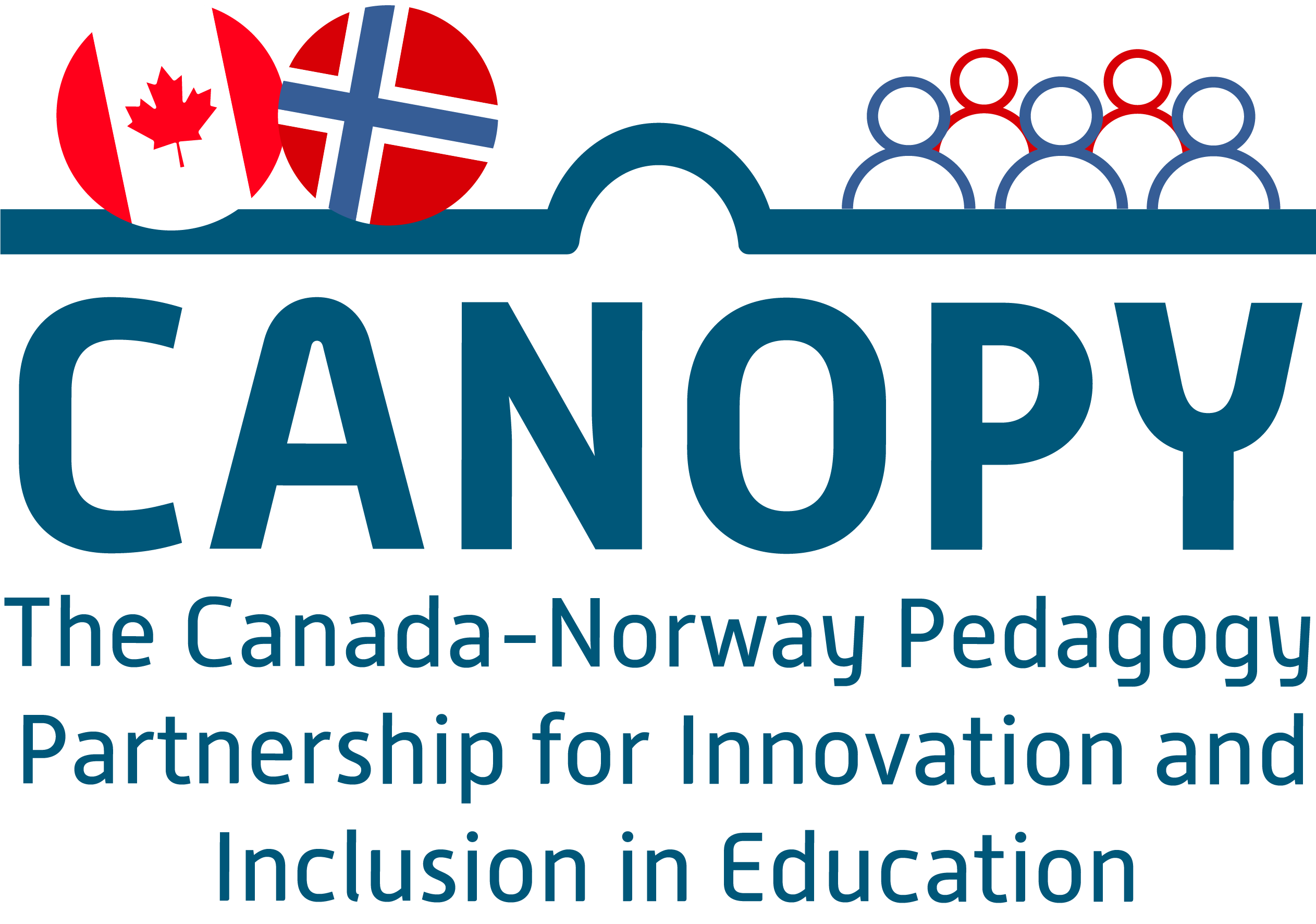
Leaders Discussing Leadership
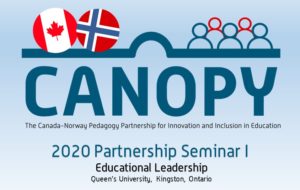 “From policy to sustainability, deep learning to intercultural engagement, progress in our field begins and ends with educational leadership,” reflects Project Manager, Morten Edvardsen. This is why, he claims, CANOPY has commenced with educational leadership as the first of four annual themes. Before the project progresses into later-year topics of Digital Innovation and Educational Technology (2021), Indigenous Studies, Diversity, and Inclusion (2022), and Exceptional Learners (2023), the foundation will be laid by a consideration of leadership. Associate Professor Nayr Ibrhaim adds, “the leadership theme underpins the four-year project as an effective participative…. Creative leadership facilitates integrative approaches and enables interconnection, which engenders deep learning—such an important concept for the twenty-first century.”
“From policy to sustainability, deep learning to intercultural engagement, progress in our field begins and ends with educational leadership,” reflects Project Manager, Morten Edvardsen. This is why, he claims, CANOPY has commenced with educational leadership as the first of four annual themes. Before the project progresses into later-year topics of Digital Innovation and Educational Technology (2021), Indigenous Studies, Diversity, and Inclusion (2022), and Exceptional Learners (2023), the foundation will be laid by a consideration of leadership. Associate Professor Nayr Ibrhaim adds, “the leadership theme underpins the four-year project as an effective participative…. Creative leadership facilitates integrative approaches and enables interconnection, which engenders deep learning—such an important concept for the twenty-first century.”
On 13-14 January, the 2020 CANOPY Partner Group (CPG) met for their inaugural Partnership Seminar – Educational Leadership I – at Queen’s University in Kingston, Ontario. The CPG is an annually-rotating fourteen-member collective of specialists. Within the group, Canada and Norway are each represented by seven members per year, comprehending:
- one representative from university leadership
- two academic staff
- one local school teacher or leader
- three teacher education students
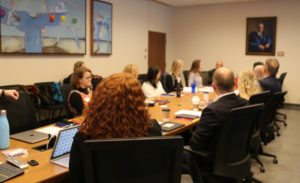
This multilevel approach is a central feature of the project, since it enables the inclusion of diverse perspectives on the annual theme. “For our focus on Educational Leadership this year” Edvardsen explains, “our group encompassed participants with wide experience as university deans, faculty division heads, department coordinators, research group/project leaders, regional superintendents, school principals, student union leaders, and teacher education students with an interest in school management.” With the addition of distinguished guest, Line B. Lønnum from the Royal Norwegian Embassy in Ottawa, Canada, the group benefited from another specialist in the field, one with practical insight into international relations and the management of intercultural education initiatives.
A project with this kind of holistic structure – gathering participants from different ranks and positions – is less common in international projects, making CANOPY quite unique. “Most partnerships,” Edvardsen remarks, “typically bring together more focused groups, such as only teachers or only principals, but this can be limiting. If we want to pursue ambitious and comprehensive goals, we must build bridges between more insular sectors in the field.”
Introductions and Presentations
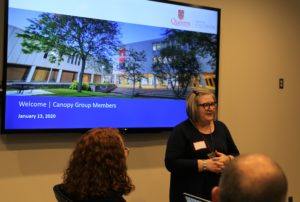
The Partnership Seminar was the inaugural meeting of the CPG – the first time bringing together students and staff from Nord/Bodø and Queen’s/Kingston – and it was thus a crucial opportunity for the group to establish important relationships and to identify fruitful affinities for long term collaboration in the field of education. Dean Rebecca Luce-Kapler (Faculty of Education, Queen’s) considered it a promising start, noting that it was “wonderful to work with colleagues from another winter country who share our desire for all people to have the opportunity to learn and thrive.” Edvardsen resoundingly agreed, complimenting the partners: “due to their excellent reputation, we already had a great impression of Queen’s University and the Ontario school system before we began our work together, but meeting these staff and students in person, we could see their dedication, energy, and quality focus. These are fantastic partners and we are quite energized by their competence and enthusiasm.”
The format of the seminar facilitated knowledge exchange and reflection. Each CPG member was responsible for leading a session about the annual topic with the entire group. Such sessions included (but were not limited to): research presentations; thematic debates; lesson plans; syllabi, programme, or curriculum development; tool, method, or module demonstrations; policy reviews, and ethical consultations. They were each followed by a question period and a group discussion. Members, such as student Andreas Strand (Nord) valued these interactive periods: “we had a lot of good discussions that revealed interesting facets of the Canadian and Norwegian school systems. Our dialogue was often so lively that we were never ready to move on to the next session!” Topics ranged from “Leadership for Epistemic Justice” to “Leadership for Musical Performance in the Classroom” (see the full seminar programme).
CANOPY members, such as student Emily Teves (Queen’s), found the sessions “thought-provoking” and “captivating,” allowing participants “to really engage with the topic of educational leadership from an international point of view.” The seminar was an ideal arena for identifying important affinities between Norway and Canada. Students participants Henriette Falch, Yael Gazit, and Maija Tangen all found this a good opportunity to identify similarities between the two countries, not only shared priorities but also challenges. Reflecting on differences, however, also highlighted “areas for improvement,” they found.
The group identified a number of specific areas for further collaboration. Edvardsen said that “curriculum and learning meetings were at the centre of our conversations about educational leadership. But we also discovered important elements for development in later years of the project. For example, the work with Indigenous studies done by Queen’s, especially in their Aboriginal Teacher Education Program (ATEP and ATEP-Community) productively links with our national responsibility for Sami language and education at Nord.”
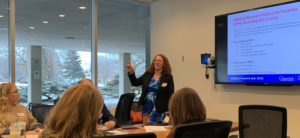
With such a range of participants and sessions, there was plenty of opportunity for members to learn from each other. “There were quite a few memorable presentations,” says Ibrahim. “For example, Professor Amanda Cooper’s talk was one of the first and set the scene for discussions around translating the knowledge generated at universities to the greater public. She also shared a series of research tools, methods, and approaches that could potentially be used for research projects coming out of CANOPY. Superintendent Paul Valle’s introduction to the management structure of the Ontario school system was also fascinating. The group particularly liked his “W” model, or what he called the “W effect” of educational planning, implementing, learning, gathering evidence, reflecting, and learning again in schools. This was brand new to us and is something we will certainly bring back to our work here in Norway.”
Amplifying Student Voices
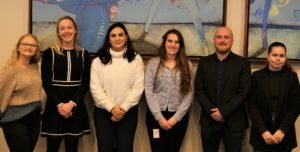
A notable feature of the Partnership Seminar was that these sessions and collaborative activities were not restricted to staff; student members of CANOPY from all years of their B.Ed. and MAGLU degrees participated fully throughout meetings. Edvardsen explains, “by including students in these seminars and the consequent collaboration/dissemination activities, we aim to provide them with valuable experience and training. Many teacher education students go through their degrees without ever engaging with the broader international education community nor forming wider networks of colleagues and mentors. Likewise students at this level rarely get the chance to work alongside top professionals in the field. We hope this will be an distinctive advantage to their training.”
Indeed, the students considered it an extraordinary component of their professional development:
“The CANOPY Seminar was such a great learning experience. Being a first year student, I have a lot to learn, and many things to discover. I learned so much from listening and discussing different topics with my fellow participants, both the other students, and the professionals.” – Henriette Falch, MAGLU-1, Nord University
“I am incredibly grateful for this experience and I look forward to taking the valuable knowledge I have learned with me throughout my career in education.” – Emily Teves, 4th Year Con.Ed., Queen’s University
“The fact that we get to meet people from different places with different experiences and cultures, exchange thoughts and ideas, and see things from different perspectives, helps us evolve and become better at our current and future roles in the field of education.” – Maija M. Tangen, MAGLU-3, Nord University
“Taking part in the CANOPY project has been eye-opening, enlightening and enriching. It is a wonderful platform for educators and learners to share knowledge, experiences and gain global perspective.” – Madison Berrisford, 3rd Year Con.Ed., Queen’s University
Lars Kirkhusmo Pharo, the Vice Dean for Research and Development at Nord University, firmly supports this initiative. “Quality international collaboration,” he says, “is a priority for the Faculty of Education and Arts at Nord University. In our pursuit of this objective, we cannot exclude the valuable contributions of our students. CANOPY’s incorporation of teacher education students into their research, development, and training activities will not only benefit the students, but it will also enhance the field.”
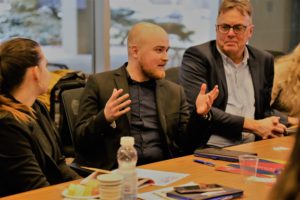
Indeed, Edvardsen clarifies that this was the motivation behind such an egalitarian structure: “the project aims to foreground a range of voices, especially those of students, who are sometimes excluded from larger educational initiatives. We cannot simply advocate for important developments in the field but then exclude our future teachers and prospective leaders from those discussions and decisions that will directly impact their professional lives. Our teacher education students have perhaps the most valuable insight right now. Throughout their coursework and practicum they are simultaneously pupils, researchers, and teachers, and we have found their contributions to be refreshing and forward-thinking. Surely, they gain a lot from participating, but I believe the project benefits even more from their involvement.”
When interviewed about their experience, this open-minded inclusion was a virtue, according to the students:
“For us students, there was one thing that we especially noticed and appreciated as a part of this group consisting of researchers, university managers, and school leaders: we were equals. Our voices were heard, and they wanted to hear it. For us that really matters, and made the whole trip meaningful to us!” – Andreas Strand, MAGLU-2, Nord University
“It is a privilege to be able to form professional partnerships and real life friendships with people overseas to build our international community – especially in an environment where students are treated with as much respect as the professors in the room!” – Yael Gazit, 4th Year Con.Ed., Queen’s University
“This is an experience of a lifetime. It meant a lot to me to have a voice in all of this.” – Maija Tangen, MAGLU-3, Nord University
“What I found most exciting about this seminar is the fact that us students got to participate at the same level as the professionals, and we got to speak our mind and be heard and respected… I am truly proud to be a part of the CANOPY partnership.” – Henriette Falch, MAGLU-1, Nord University
Student participation was not just superficial; staff participants affirmed that they performed excellently. Ibrahim says that she “was highly impressed by the CANOPY students and their confidence in contributing their ideas and opinions; they were well prepared, they were full of passion, they were well organized, funny and interesting; most importantly, they were able to let their identities, and different personalities shine through. They were, and are, equal partners in this project and they have enriched it so much already. It was a real pleasure working with these students.”
Looking Ahead
Now CANOPY members will begin envisioning future opportunities for this project. Dean Luce-Kapler says that “this partnership will result in research and learning that will have an important impact in both Canada and Norway.” Additionally, she told the Queen’s Gazette, that the Seminar uncovered “exciting possibilities for future collaborations and wonderful ideas that each of us will be taking away with us in our practice.” In the coming months, the group will be working closely to identify further synergies and continuities that can set the foundation for more cooperation, such as research clusters, dissemination strategies, guest lecture opportunities, funding prospects, and pedagogical initiatives to benefit faculty programs and larger education systems in the partner countries.
Edvardsen concluded that “this was an ideal start to the project. We are excited for the work ahead and we look forward to welcoming the group for the second CPG Seminar – Educational Leadership II – in Bodø this May.”
To learn more about other CANOPY activities, visit the News and Events page.
Article Update: due to COVID-19, the May 2020 CANOPY seminar has been cancelled. Please follow the Project Update page for further information and important developments.
More from the Partnership Seminar:
[robo-gallery id=653]